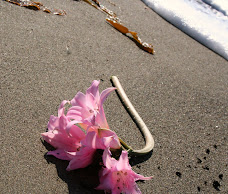
After a Winter Storm
The white china sky broke this morning
so the Diner brought out the blue-plate special.
Customers fell into a frenzy for it.
You over there: Can you hear them
pounding the tables with their forks?
Can you hear the slap of waitress feet
and the hiss of fat on the stove?
(This is a Friday Flash 55, a challenge hosted by the G-Man. Go visit his blog for more strange recipes in exactly 55 words.)
When I was growing up, child of Depression-era parents, we saved bacon fat, pouring it into a crock that sat on the back of the stove. Anything to be fried we fried in a heaping spoonful of that softly solidified bacon fat heated in the old cast-iron frying pans. How old was the fat at the bottom of the crock? Was it safe to cook with? Nobody asked. A mess of green beans fried in bacon fat was delicious. A pan of chopped potatoes and onions was scrumptious. That’s what you cared about. There was lard for pie crusts, shortening for Betty Crocker baking recipes, margarine for bread, and bacon fat for frying. I never heard of olive oil until I was married. I learned the word “sauté” then, too. Somewhere along the line, I disposed of the bacon-fat crock.
We lived on beans, beans and biscuits, beans and cornbread, black-eyed beans and ham hocks, chili beans. We had Spam, hamburger patties, beef stew, corned beef hash, chicken-fried steak, and pot roasts on special occasions. There was always gravy. We ate beets and green beans, potatoes, buttered carrots, fresh corn on the cob and canned peas. We had homemade cole slaw or shredded carrots with raisins, or iceberg lettuce with thousand island dressing made with catsup, pickle relish and mayonnaise, or Jell-O salad with fruit cocktail, or sliced fresh tomatoes picked that morning.
When we were really lucky, we had fresh abalone steaks dredged in smashed saltine crackers and fried in fat. I have two memories of abalone. In one, my older brother and I went with my dad and uncle to a friend’s ranch on the coast, and we rode in a Jeep over a mountain down to the rocky shoreline. There the men pried abalone off the rocks while my brother and I entertained ourselves. I had to go number two, and there was nothing to use but ice plant, which grew everywhere, and it was not an unpleasant, albeit strange, substitute for toilet tissue.
In the other memory, the men brought gunny sacks full of abalone into my grandfather’s sawdust-filled garage, where they gouged the shellfish from the shell and pounded the abalone with hammers. The women were cooking in the kitchen until the men came in with platters heaped high with abalone steaks. Then the men took over the kitchen. Cousins were running around everywhere. Women in aprons bustled back and forth. That abalone feast was the best thing I had ever eaten.
We eat healthier now. We use fresh-pressed extra virgin olive oil grown locally, or real butter. No more margarine or bacon fat. I buy a bit of Crisco in packaged blocks at Christmas time, and a block of lard only if I’m going to make a pie. I make a fine gravy at Thanksgiving or the occasional family breakfast. Abalone hunting is banned around here. We don’t eat canned vegetables or Spam or corned beef hash. My husband doesn’t like beans much. I never eat Jell-O salad except on Christmas Eve when my aunt makes my grandmother’s recipe.
I learned how to cook in Home Economics when I was 13, and from then on I was the cook in the family, coming home from school and making dinner for my working parents. I branched out from Betty Crocker. In college I cut out recipes from magazines and bought other cookbooks. I cooked dinners for friends. Friends taught me about other foods. I began eating in fine restaurants. I invented recipes. I cooked for more than 45 years, as a teenager, college student, young wife, single parent, and older, wiser wife. When my husband was injured out of his career, he went to culinary school. Now he’s the cook except for Thanksgiving, and this past year, I started teaching him how to roast a turkey. Sometimes I miss the bacon fat. There are few more wonderful breakfasts than bacon-fat gravy with sausage bits and biscuits made from scratch.












